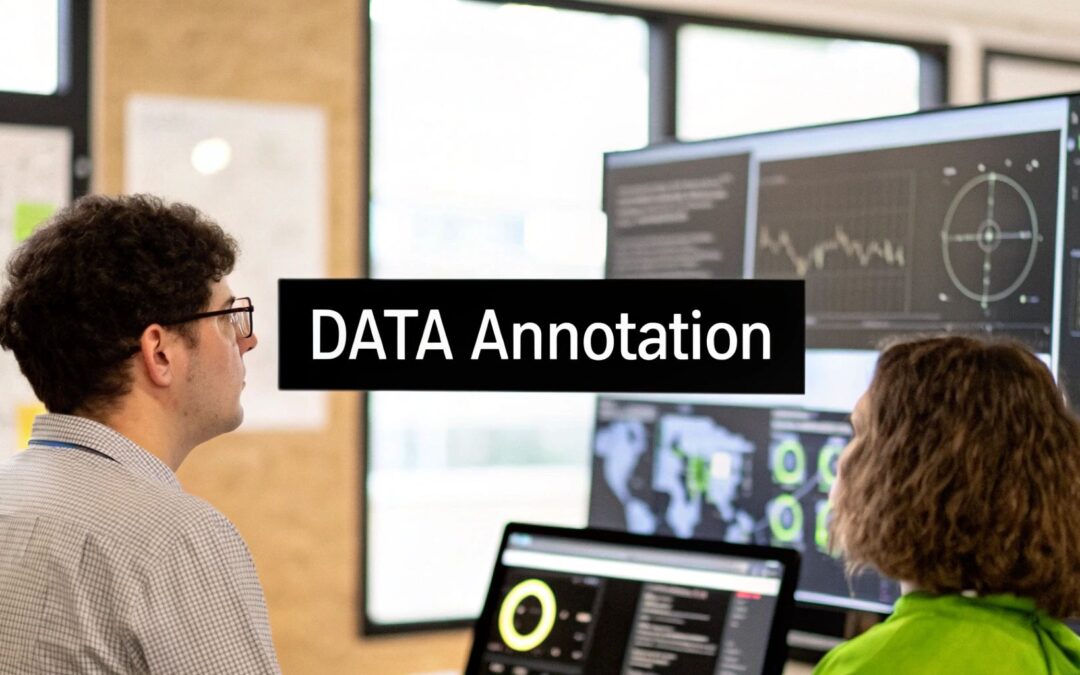In the race to build powerful AI, high-quality labeled data is the fuel that powers every algorithm. But sourcing, preparing, and managing this data is a complex, resource-intensive challenge. The right partner can make all the difference, transforming raw information into the AI-ready assets that drive model accuracy and performance. This is where data annotation service providers become critical.
This guide moves beyond marketing claims to offer a practical, in-depth analysis of the leading providers. We will equip you with the insights needed to select the best partner for your specific project, whether you're a tech startup needing to scale quickly or an enterprise AI team developing sophisticated models.
You will find a detailed breakdown of each service, complete with screenshots and direct links. We will compare their core features, vertical expertise in sectors like retail and healthcare, and their scalability options. This resource is designed to help you find the best platform for your needs, evaluating providers on crucial factors like quality control, security protocols, and pricing structures. Our goal is to simplify your decision-making process, ensuring you can confidently choose a partner to turn your raw data into a true competitive advantage.
1. Image Annotation Services | Zilo Services
Zilo Services establishes itself as a premier choice among data annotation service providers by offering a highly specialized yet comprehensive suite of image annotation solutions. Backed by the robust infrastructure of Zilo AI, the platform excels at delivering high-precision training data crucial for developing sophisticated computer vision models. Their service is not just about labeling; it's about creating AI-ready datasets that genuinely enhance model performance, from object detection to complex scene understanding.
What truly distinguishes Zilo Services is its integrated approach, which combines a globally sourced, highly skilled workforce with rigorous, multi-tiered quality control protocols. This powerful combination ensures both scalability for large-volume projects and the nuanced accuracy required for intricate tasks like semantic segmentation and landmark annotation. For teams in sectors like retail, healthcare, or autonomous systems, this means faster development cycles and more reliable AI outcomes.
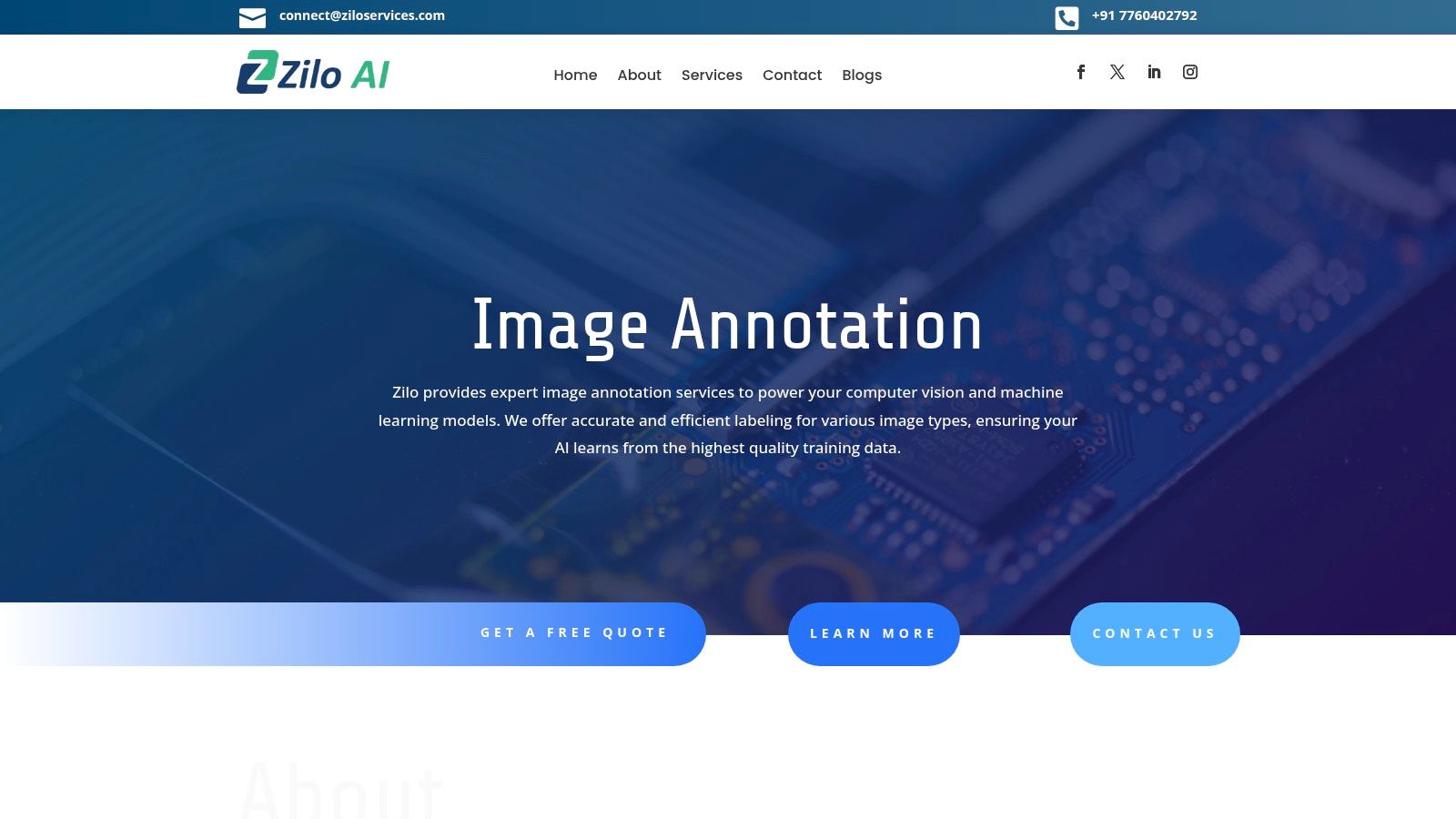
Key Strengths and Use Cases
Zilo’s operational excellence shines in its ability to manage diverse annotation requirements. Their portfolio covers everything from basic bounding boxes for e-commerce product recognition to detailed polygonal and semantic segmentation for medical imaging analysis or autonomous vehicle perception systems.
Practical Insight: A key advantage is their expertise in handling multilingual and cultural nuances within datasets. This capability is invaluable for global companies developing AI applications that need to perform consistently across different regions and languages, preventing cultural bias and improving model generalizability.
Implementation and Engagement
- Flexible Models: Zilo offers tailored engagement models, accommodating everything from one-off projects for startups to long-term, dedicated annotation teams for large enterprises.
- Pricing: Pricing is project-dependent, factoring in the complexity of the annotation (e.g., semantic segmentation is more intensive than bounding boxes), data volume, and required turnaround time. Prospective clients should engage with their team for a detailed quote.
- Collaboration: For highly niche or customized annotation tasks, Zilo encourages close collaboration to define precise guidelines and ensure the final dataset perfectly aligns with the client's model specifications.
Best for: AI/ML development teams in retail, healthcare, and automotive industries seeking a scalable, high-quality partner for complex image annotation projects.
Visit the website: Image Annotation Services by Zilo Services
2. Appen
Appen stands out as a global powerhouse among data annotation service providers, leveraging a massive, distributed workforce of over one million skilled contractors across 170+ countries. This vast network allows them to tackle large-scale, multilingual data projects with impressive speed, making them an ideal partner for enterprises needing diverse and high-volume annotation for AI models. Their services cover a wide spectrum, including image, text, audio, and video annotation.
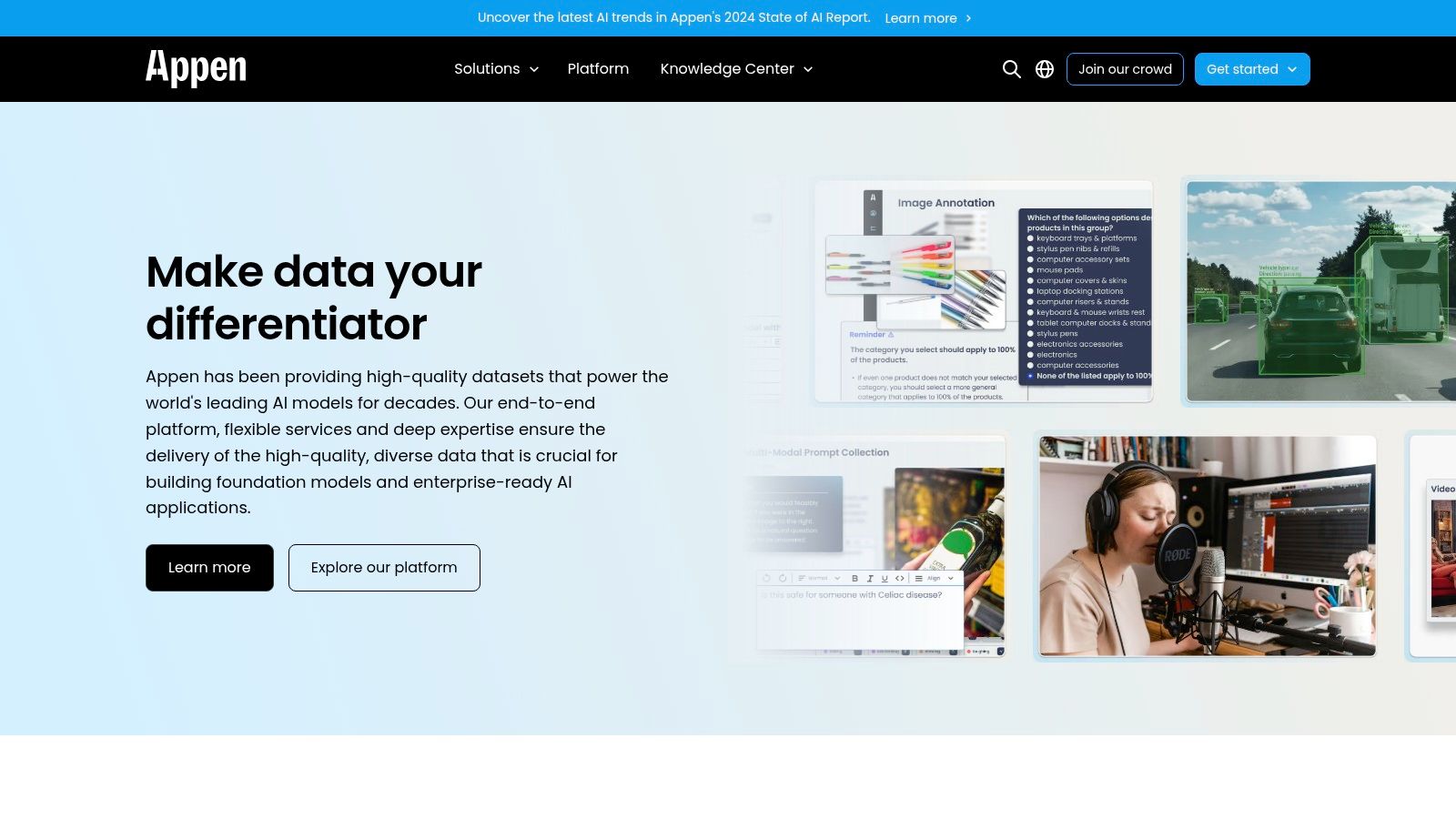
The platform is particularly well-suited for industries like technology, automotive, and healthcare that require nuanced and domain-specific data labeling. Appen’s ISO 9001 certified quality processes provide a layer of assurance, though the distributed nature of their workforce can sometimes lead to variability in output. Understanding data annotation's role is crucial, especially for emerging companies. Explore why data annotation is critical for AI startups to see how services like Appen's can accelerate development.
Key Considerations
- Best For: Large enterprises requiring multilingual data sets and rapid scalability.
- Pricing: Custom-quoted based on project scope. Pricing can be less transparent for smaller, one-off projects compared to managed service contracts.
- Pros: Massive global workforce, strong industry expertise, and robust quality management systems.
- Cons: Potential for quality inconsistency and opaque pricing on smaller-scale engagements.
Website: https://appen.com/
3. Scale AI
Scale AI has carved out a premium niche among data annotation service providers by powerfully combining machine learning-powered automation with a human-in-the-loop (HITL) review process. This hybrid approach allows them to deliver exceptionally accurate and high-quality labeled data at speed, making them a go-to partner for technology-forward companies. They excel in complex domains like autonomous vehicles, robotics, e-commerce, and generative AI, handling sophisticated multi-modal data annotation requirements with precision.
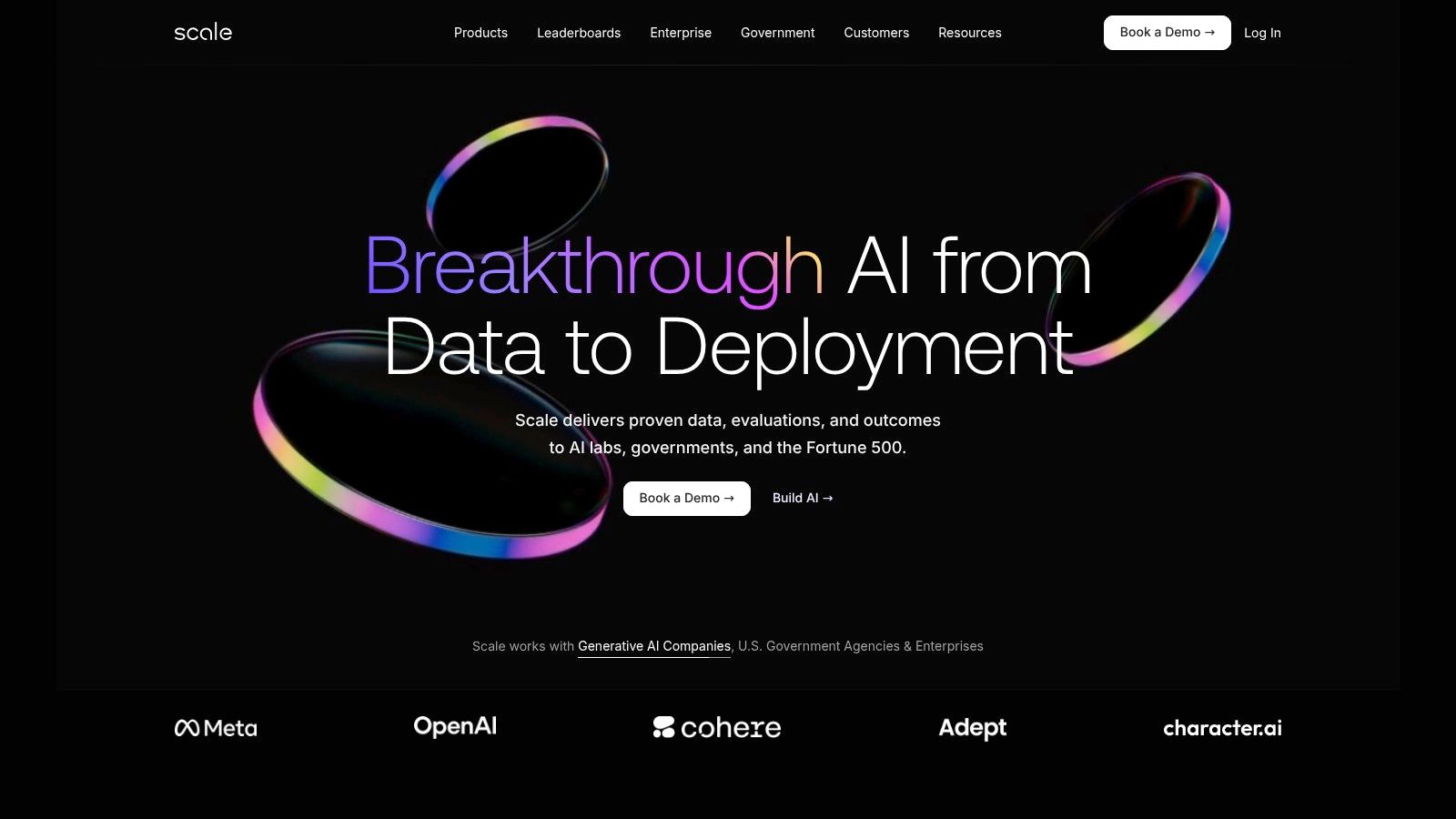
Their platform is engineered for rapid turnarounds on large, intricate datasets, a critical factor for teams working on cutting-edge AI models. Scale AI’s strong reputation is built on its work with high-profile industry leaders, demonstrating its capacity to meet stringent quality and security standards. This focus on advanced automation and high-stakes projects differentiates them from providers that rely more heavily on purely manual annotation.
Key Considerations
- Best For: AI-first companies and enterprises in high-tech sectors needing top-tier accuracy for complex computer vision or NLP tasks.
- Pricing: Custom-quoted and positioned at a premium tier, reflecting the advanced technology and high-quality output.
- Pros: Advanced ML-assisted annotation, extremely high accuracy, and a strong industry reputation for handling complex projects.
- Cons: Premium pricing may be a barrier for startups or smaller projects, and its QA process can be less transparent than some competitors.
Website: https://scale.com/
4. iMerit
iMerit positions itself as a premium partner among data annotation service providers, delivering high-precision, end-to-end solutions for complex AI applications. They specialize in nuanced domains like medical AI, autonomous vehicles, and geospatial intelligence where data quality is paramount. Their approach combines expert human-in-the-loop annotation with a proprietary platform, Ango Hub, giving clients full transparency into project workflows and quality metrics. This focus on security and precision makes them a top choice for organizations handling sensitive or mission-critical data.
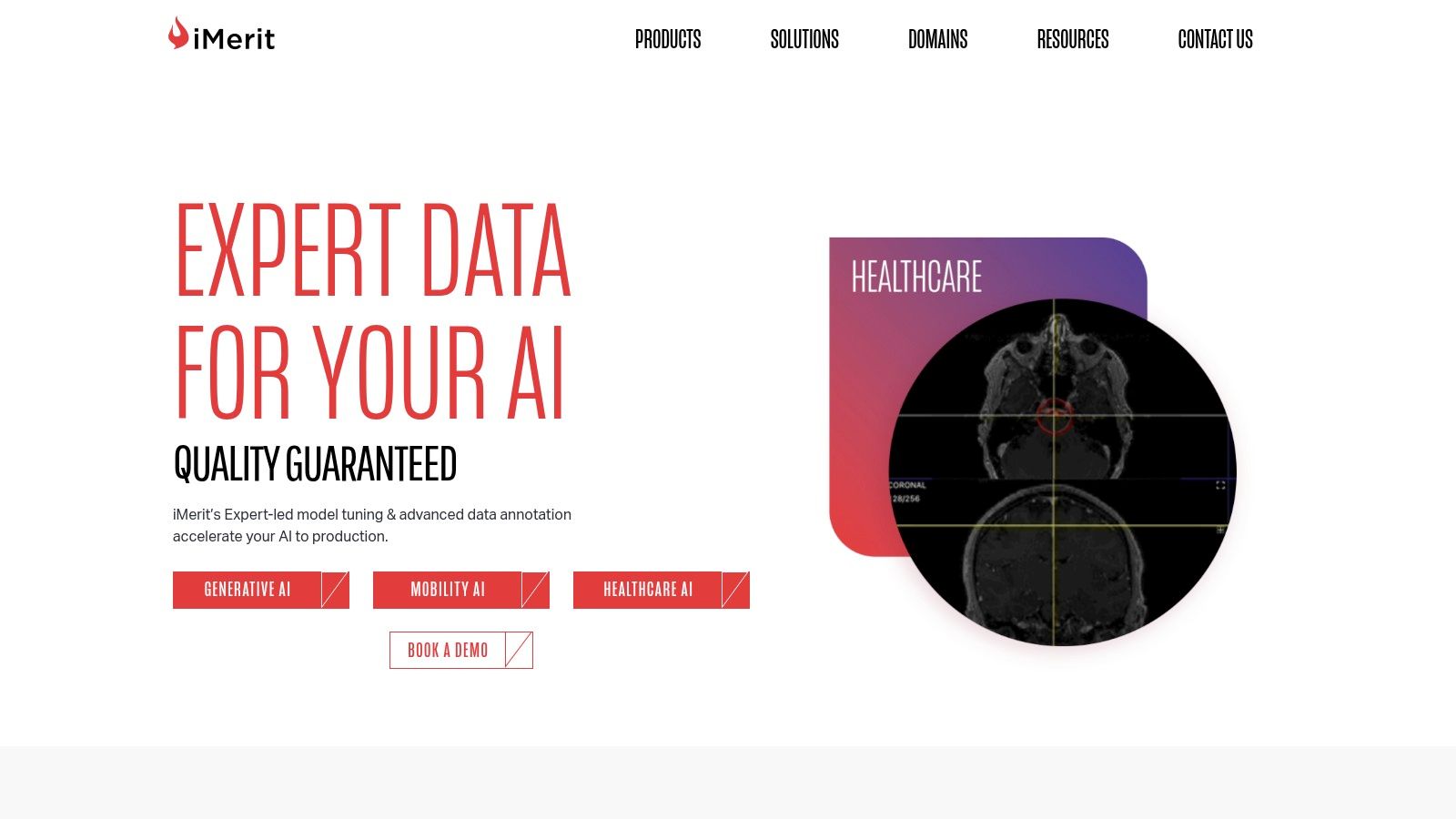
The company’s commitment to security is underscored by its ISO 27001 and SOC 2 certifications, offering a level of trust that is essential for industries such as healthcare and finance. While their rigorous onboarding and specialized team training ensure exceptional output, this detailed process can lead to a slower project kickoff. This makes iMerit less suitable for teams needing immediate, low-complexity labeling but ideal for those prioritizing accuracy and domain expertise over sheer speed for long-term, sophisticated AI initiatives.
Key Considerations
- Best For: Companies in regulated industries (healthcare, autonomous systems) needing highly accurate and secure data annotation.
- Pricing: Custom project-based pricing; generally positioned as a premium service.
- Pros: Exceptional data quality and security, deep expertise in complex verticals, and strong workflow visibility.
- Cons: Slower project initiation due to specialized onboarding, which may not be ideal for fast-turnaround jobs.
Website: https://imerit.net/
5. CloudFactory
CloudFactory distinguishes itself among data annotation service providers by blending a managed human workforce with automation, emphasizing both quality and ethical outsourcing. They deliver scalable solutions for industries like technology, finance, and healthcare, focusing on building dedicated teams that integrate directly into a client's workflow. This "workforce-as-a-service" model ensures consistency and deep domain understanding for complex, long-term projects.
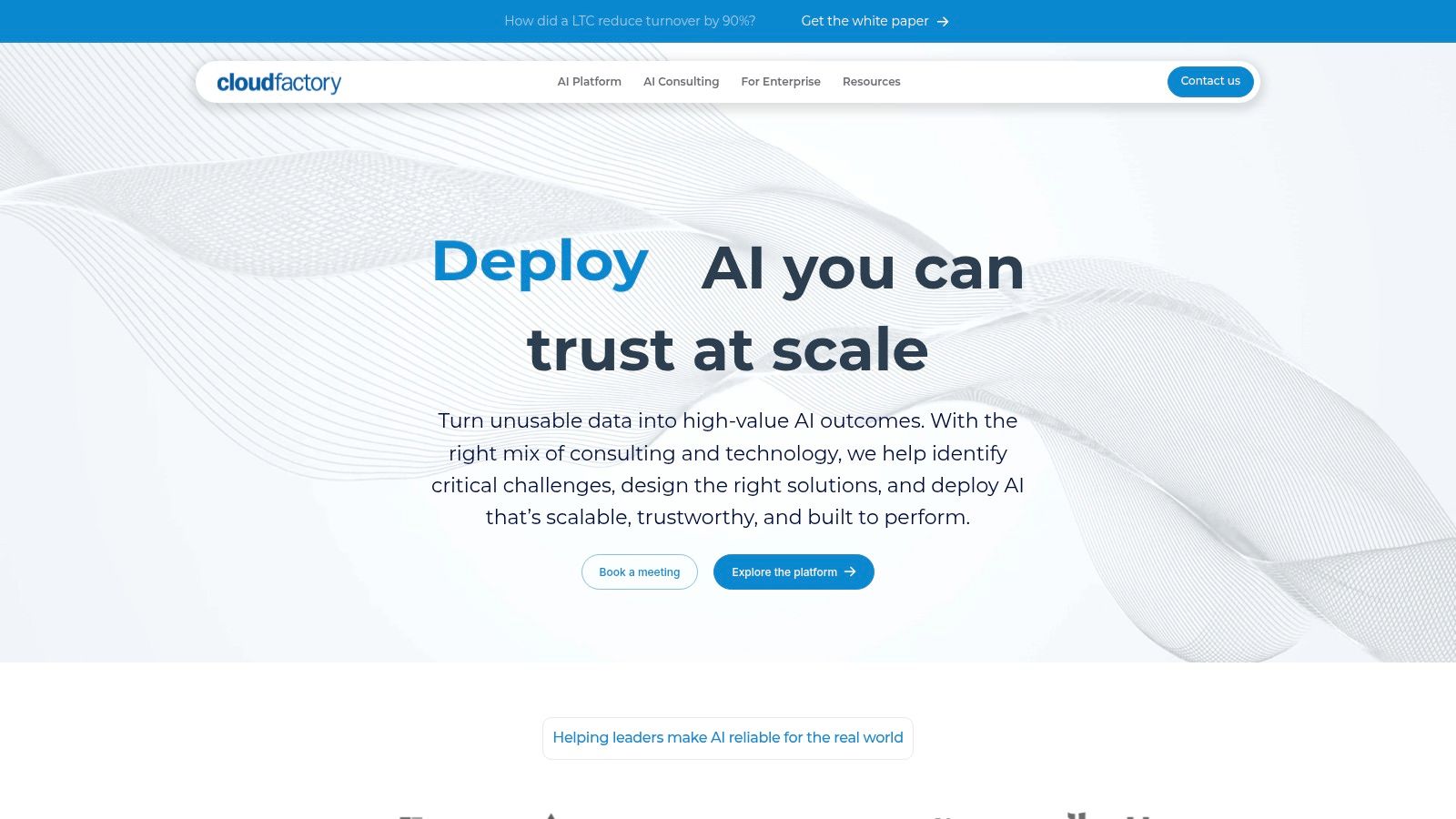
The company’s commitment to ethical practices provides a compelling value proposition for organizations concerned with social impact. While the platform's interface may present a learning curve, the model is ideal for businesses needing a reliable, scalable extension of their in-house data teams. Many top service providers have a presence in key tech hubs, and CloudFactory is no exception. For more context on regional leaders, you can explore top data annotation companies in India and see how they compare.
Key Considerations
- Best For: Companies needing a dedicated, managed workforce for ongoing, complex annotation tasks with a focus on ethical sourcing.
- Pricing: Custom-quoted, typically based on a managed team model rather than per-task pricing, which favors long-term partnerships.
- Pros: Strong focus on ethical outsourcing, high-quality output from dedicated teams, and flexible, customizable solutions.
- Cons: Onboarding can be longer due to team training, and the platform interface may require an initial adjustment period.
Website: https://www.cloudfactory.com/
6. SuperAnnotate
SuperAnnotate positions itself as an end-to-end platform for building high-quality training datasets, blending powerful annotation tools with integrated project management and automation. It supports a wide array of data types, including images, video, text, audio, and even complex 3D point cloud data, making it a versatile choice for teams in industries like autonomous driving, robotics, and medical AI. The platform offers both a self-serve tool and a fully managed service, providing flexibility for organizations of all sizes.
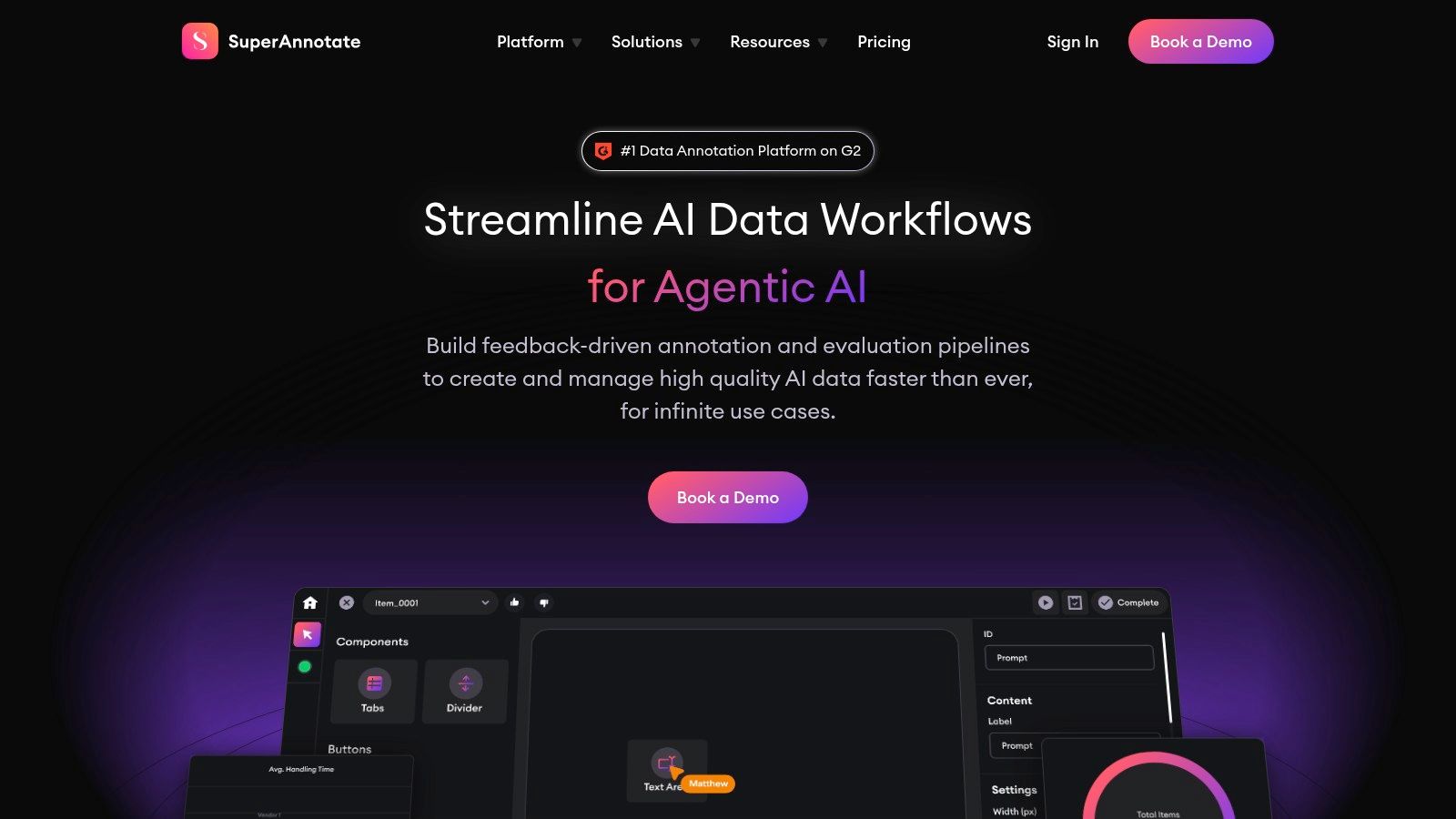
What makes SuperAnnotate a notable name among data annotation service providers is its focus on accelerating the annotation pipeline through automation and robust quality assurance (QA) features. Its user-friendly interface is designed to boost annotator efficiency, while powerful analytics help managers monitor progress and quality. This combination of tooling and service makes it a strong contender for teams that require granular control over their data labeling process without sacrificing speed or accuracy.
Key Considerations
- Best For: AI teams in sectors like autonomous vehicles, robotics, and healthcare needing advanced tooling and project management for complex data types.
- Pricing: Offers tiered plans (Starter, Pro, Enterprise) with custom pricing based on features, usage, and service level.
- Pros: Comprehensive annotation toolset, strong quality control measures, and a modern, user-friendly interface.
- Cons: The platform's extensive features can present a learning curve for new users, and some advanced automation capabilities may require additional setup.
Website: https://superannotate.com/
7. Labelbox
Labelbox positions itself as a comprehensive training data platform, distinguishing itself from other data annotation service providers by focusing on the entire machine learning pipeline. It combines data labeling, cataloging, and model diagnostics into a single, collaborative environment. This integrated approach allows teams to manage, annotate, and iterate on their datasets with greater efficiency, making it a powerful tool for organizations aiming to build and maintain high-performing AI models over time.
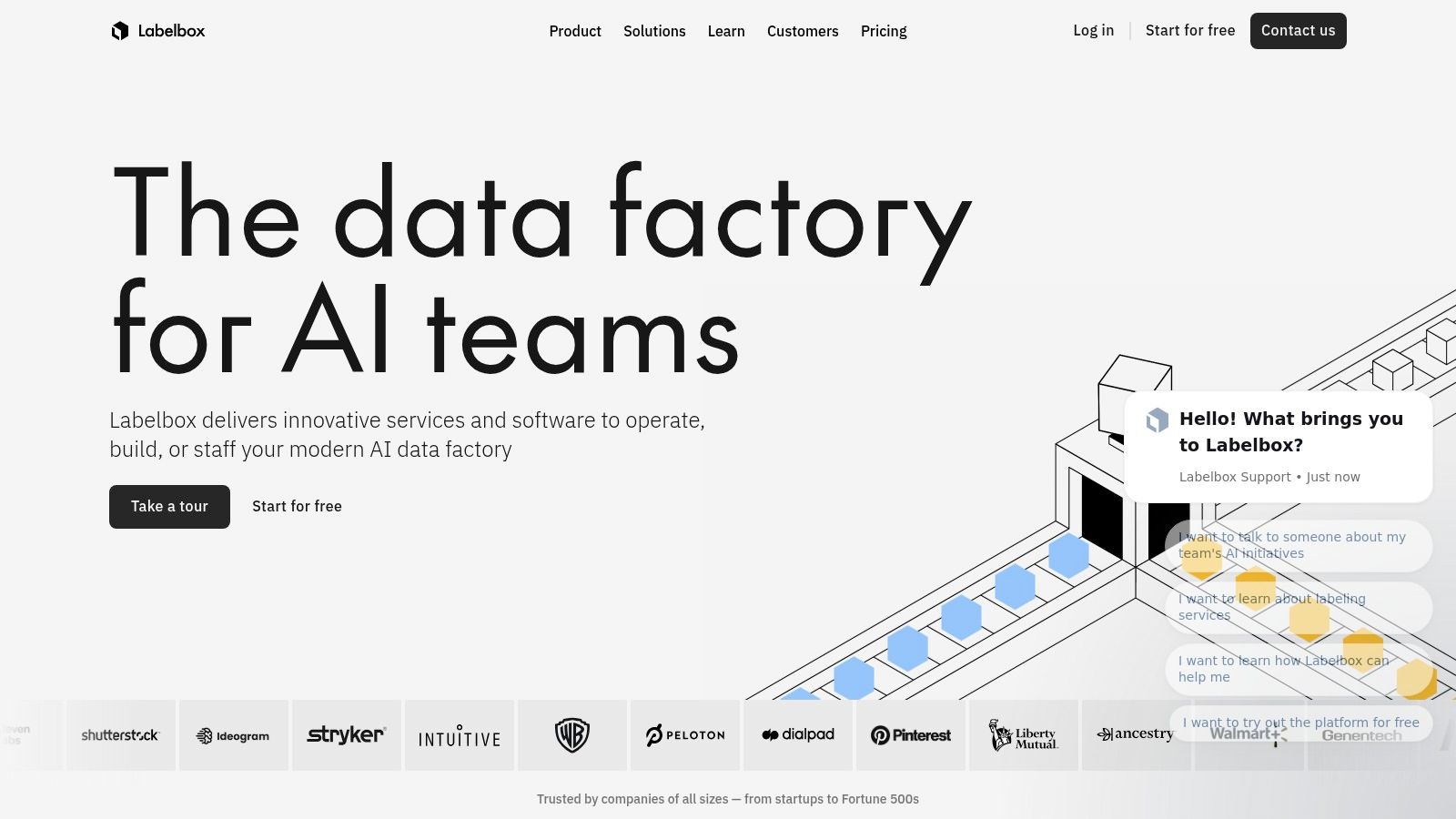
The platform’s strength lies in its user-friendly interface and robust project management tools, which facilitate seamless collaboration between data scientists, labelers, and project managers. Its real-time tracking and analytics features provide deep insights into labeling quality and progress. While Labelbox offers flexible integration options and supports various annotation types, its enterprise-focused plans may present a cost barrier for smaller businesses or startups with limited budgets. The platform is best utilized when treated as a central hub for all data-centric AI development activities.
Key Considerations
- Best For: AI-first companies and enterprise teams needing a unified platform to manage the entire data annotation and model training lifecycle.
- Pricing: Offers a free tier for individuals and small teams. Paid plans (Pro and Enterprise) are custom-quoted based on usage and features.
- Pros: Excellent user interface, powerful project management tools, and seamless integration capabilities for a holistic AI pipeline.
- Cons: Enterprise plans can be costly for smaller organizations, and it may have limitations with highly niche or specialized data types.
Website: https://labelbox.com/
8. Playment
Playment distinguishes itself as one of the highly specialized data annotation service providers, focusing almost exclusively on complex video and sensor fusion datasets for the autonomous vehicle (AV) and robotics industries. Their expertise shines when dealing with intricate scenarios, such as 3D point cloud segmentation, LiDAR-camera fusion (sensor fusion), and video tracking, which are critical for developing robust perception models for self-driving cars and drones. This niche focus allows them to offer advanced tools and a trained workforce specifically for these demanding use cases.
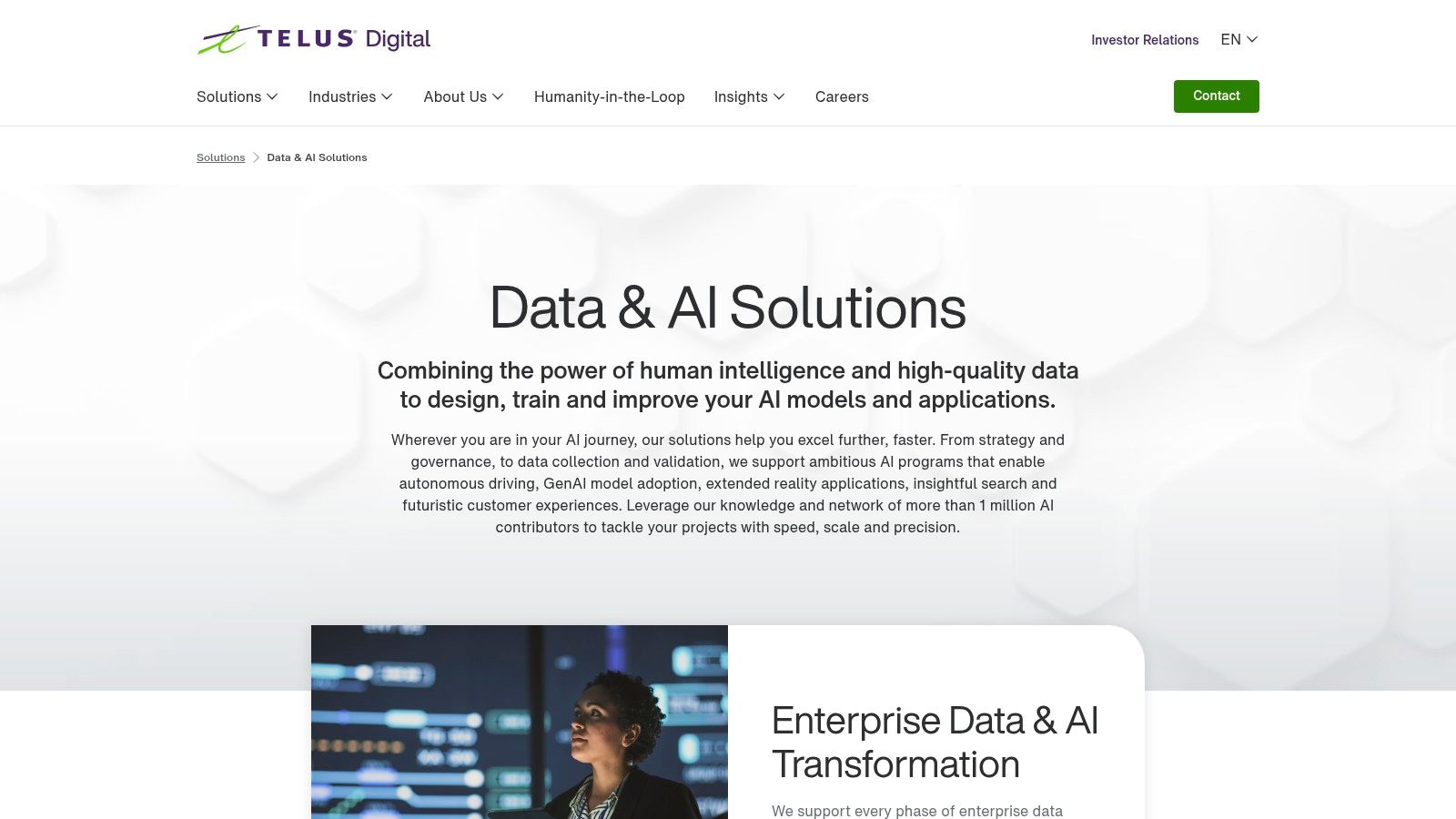
The platform is designed for teams that require extreme precision and scalability in handling edge cases common in autonomous navigation. Playment’s managed service approach provides a layer of project management and quality assurance that is essential for the safety-critical nature of AV development. Their strength lies in turning vast amounts of raw sensor data into high-quality, model-ready training sets, enabling AI teams to accelerate their development cycles without compromising on accuracy.
Key Considerations
- Best For: Autonomous vehicle developers, robotics companies, and drone manufacturers needing precise annotation of complex sensor data.
- Pricing: Project-based custom pricing. Costs can be higher due to the specialized nature of the work and the advanced tooling involved.
- Pros: Deep expertise in autonomous driving data, efficient handling of complex datasets, and flexible, customizable solutions for niche projects.
- Cons: Services are narrowly focused on specific industries, potentially making them less suitable for general-purpose annotation needs.
Website: https://www.playment.io/
9. Sama
Sama distinguishes itself among data annotation service providers by integrating a strong ethical mission with its advanced technology. The company provides high-quality training data for AI and machine learning models, with a notable focus on creating employment opportunities in underserved communities. This "impact sourcing" model ensures that while clients receive precise annotations for images, videos, and 3D point clouds, they are also contributing to a positive social outcome.
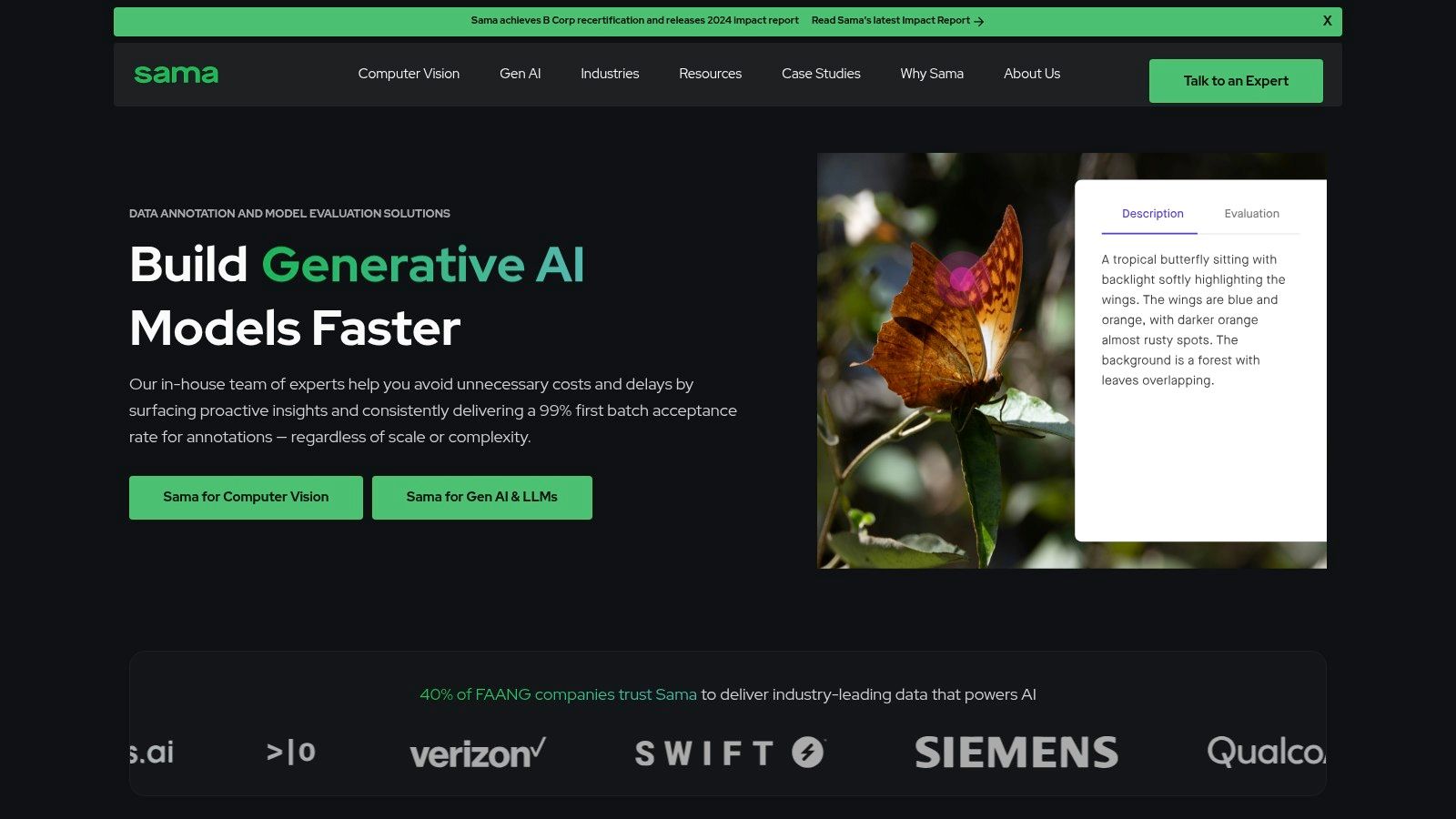
Their expertise is particularly strong in complex computer vision tasks for industries like automotive, retail, and manufacturing. Sama’s platform is built to handle intricate projects requiring high accuracy, making it a reliable choice for organizations where data quality is paramount. This commitment to ethical practices and quality makes Sama a compelling option for businesses looking to align their supply chain with corporate social responsibility goals without compromising on performance.
Key Considerations
- Best For: Companies in computer vision-heavy sectors and organizations prioritizing ethical sourcing and social impact.
- Pricing: Custom-quoted based on project complexity and volume. The ethical sourcing model may result in a higher price point compared to some competitors.
- Pros: Strong commitment to ethical practices, proven high-quality annotations, and scalable solutions for complex tasks.
- Cons: Pricing can be higher due to their social mission, and they have more limited support for data types outside of computer vision.
Website: https://www.sama.com/
10. Keymakr
Keymakr distinguishes itself among data annotation service providers by merging its proprietary annotation platform, Keylabs, with a dedicated in-house team of trained annotators. This integrated approach allows for exceptional control over the annotation process, ensuring high-quality, consistent output. The company’s robust four-tier quality assurance protocol is a key feature, making it a reliable partner for projects where precision is non-negotiable, particularly in complex fields like automotive, robotics, and healthcare.
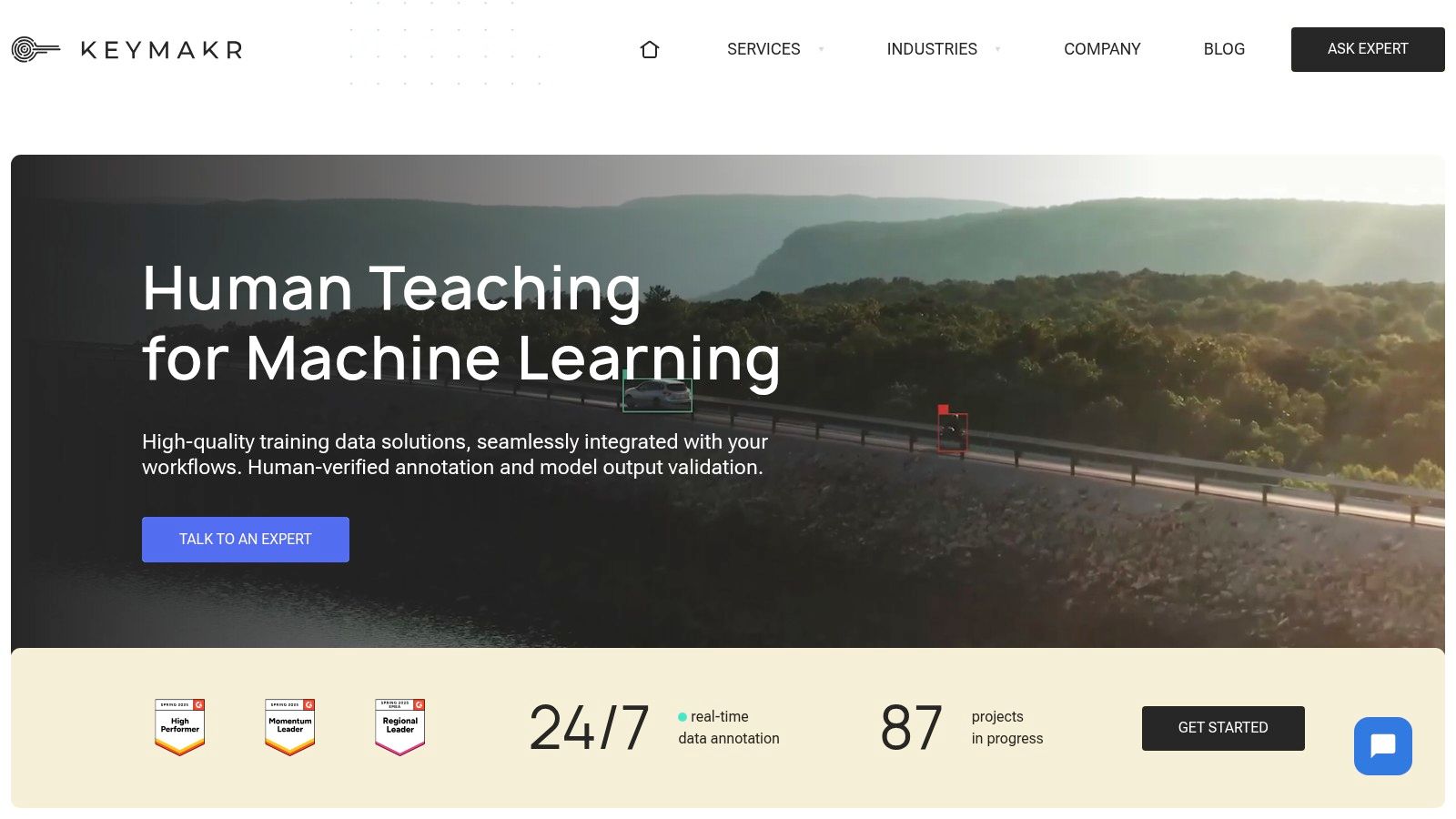
The platform is best suited for organizations that prioritize data accuracy and security over the sheer volume offered by crowdsourcing models. While the Keylabs interface is powerful and customizable, new users might face a slight learning curve to fully leverage its capabilities. The focus on an in-house team provides superior quality control but may not offer the same rapid, massive scalability as platforms with distributed workforces, making it a strategic choice for mission-critical computer vision models.
Key Considerations
- Best For: Companies in high-stakes industries like automotive and healthcare that require top-tier accuracy and have complex annotation needs.
- Pricing: Project-specific custom pricing.
- Pros: Extremely high-quality annotations, rigorous multi-tier quality control, and solutions tailored to specific project requirements.
- Cons: The in-house team model is less suited for massive, rapid scaling, and the proprietary platform may require some initial onboarding.
Website: https://keymakr.com/
11. Toloka
Toloka distinguishes itself from other data annotation service providers by offering a holistic suite of AI development services that go beyond simple labeling. It combines a powerful crowdsourcing platform with advanced generative AI support, making it a unique partner for teams working on cutting-edge models. Their services include model fine-tuning, reinforcement learning from human feedback (RLHF), and comprehensive model evaluation.
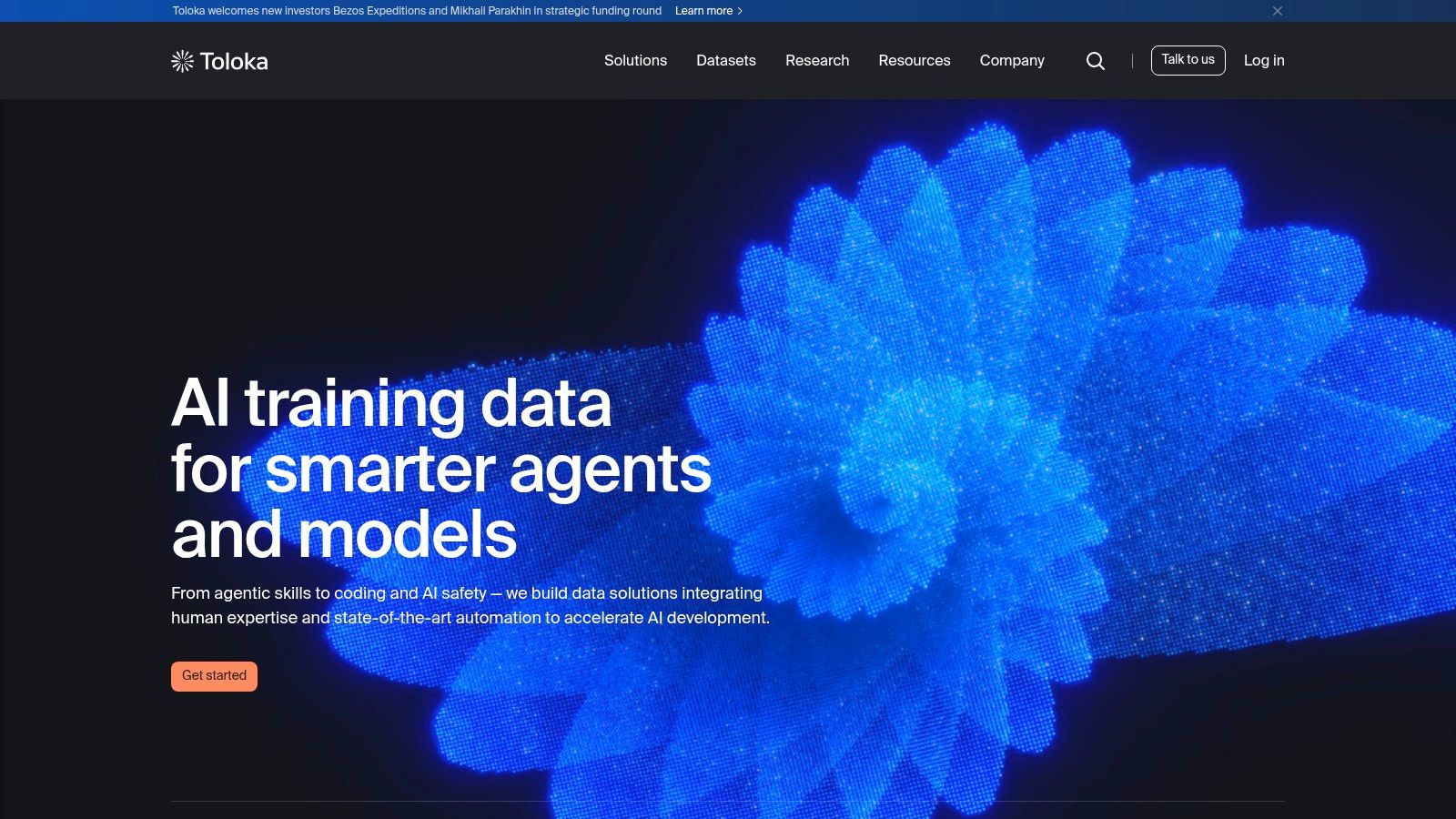
The platform is particularly valuable for organizations that need more than just annotated data; they need a partner to refine and validate their AI systems. This end-to-end approach helps ensure that the final models are not only accurate but also aligned with business objectives. By integrating data collection, annotation, and model training feedback loops, Toloka empowers businesses to leverage data-driven decision-making throughout the AI lifecycle. This integrated workflow makes it a strong contender for complex AI projects.
Key Considerations
- Best For: AI development teams needing comprehensive support, including RLHF, model fine-tuning, and evaluation.
- Pricing: Custom-quoted based on the specific services and project complexity. Detailed pricing information is not publicly available.
- Pros: Integrated generative AI services, expert data labeling, and adaptability across diverse AI applications.
- Cons: Pricing is not transparent, and effective use may require deeper integration with existing development workflows.
Website: https://toloka.ai/
12. Macgence
Macgence positions itself among data annotation service providers by emphasizing precise and comprehensive data labeling across multiple formats, including image, text, audio, and video. It carves out a niche by specializing in complex, high-stakes industries like healthcare, autonomous vehicles, and natural language processing. This focus ensures that their experienced annotators deliver the high-quality, consistent data labeling crucial for building reliable AI and machine learning models in these demanding sectors.
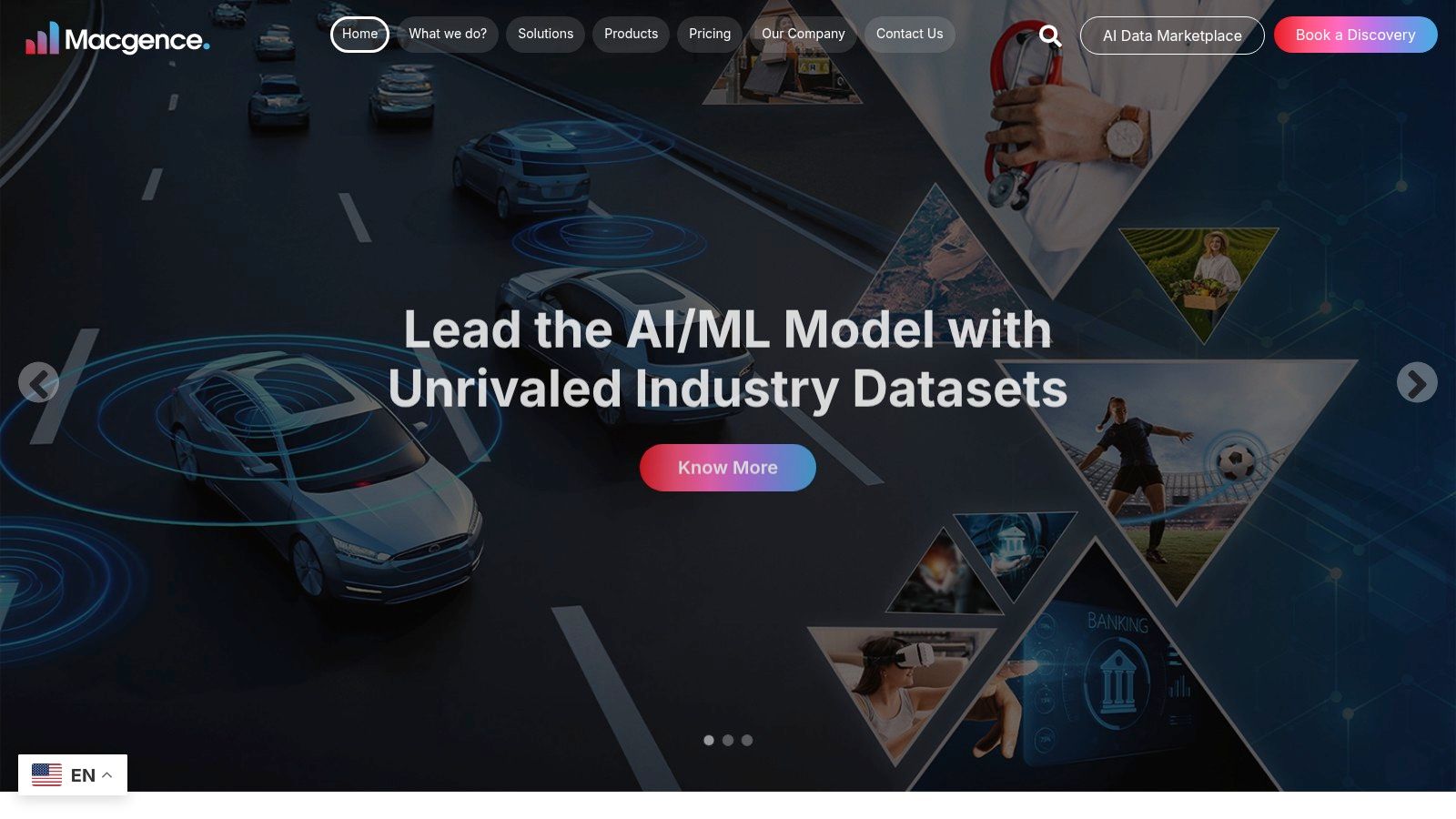
The platform is an excellent choice for organizations where annotation accuracy is non-negotiable, such as medical imaging analysis or sensor fusion data for self-driving cars. Macgence’s commitment to quality makes them a reliable partner for projects that cannot afford errors or inconsistencies in their training data. While their service offerings are comprehensive, prospective clients will likely need a direct consultation to understand project-specific capabilities and pricing structures, as this information is not readily available on their website.
Key Considerations
- Best For: Companies in healthcare, automotive, and NLP sectors needing highly accurate, domain-specific data annotation.
- Pricing: Custom-quoted, requiring direct consultation for project scoping and cost estimates.
- Pros: Strong focus on precision and data quality, comprehensive service offerings, and expertise in specialized verticals.
- Cons: Pricing is not transparent, and a consultation is necessary to determine if they are a fit for specific project requirements.
Website: https://macgence.com/
Top 12 Data Annotation Providers Comparison
| Service | Core Features / Capabilities | Quality & User Experience | Value & Pricing | Target Audience 👥 | Unique Selling Points ✨ |
|---|---|---|---|---|---|
| Image Annotation Services | Zilo Services | Bounding boxes, polygon, landmarks, semantic segmentation | ★★★★☆ | 💰Variable by project scale | Enterprises needing scalable, multilingual AI data | 🏆10M+ annotated data points, flexible models, multilingual support |
| Appen | Image, text, audio, video annotation, multilingual workforce | ★★★★☆ | 💰Opaque for small projects | Tech, automotive, healthcare industries | 🌍Global workforce, ISO 9001 certified quality |
| Scale AI | ML automation + human-in-the-loop, multi-modal support | ★★★★☆ | 💰Premium pricing | Autonomous vehicles, e-commerce, robotics | ⚡Rapid large-scale turnaround, advanced tech |
| iMerit | High-precision, complex domains, workflow visibility | ★★★★☆ | 💰Specialized onboarding cost | Healthcare, autonomous systems, geospatial AI | 🔐ISO 27001, SOC 2 certified, proprietary platform |
| CloudFactory | Human + automation, scalable, global workforce | ★★★★ | 💰Competitive with training overhead | Tech, healthcare, finance industries | ♻️Ethical outsourcing, flexible/custom solutions |
| SuperAnnotate | Platform + managed services, multi-data types, automation | ★★★★☆ | 💰Moderate, platform based | Autonomous driving, robotics, healthcare | 🛠️Comprehensive tools, QA & automation features |
| Labelbox | Collaboration, real-time tracking, AI pipeline integration | ★★★★☆ | 💰Costly for small businesses | Businesses streamlining AI workflows | 🤝Strong project management, flexible integrations |
| Playment | Video annotation, edge case handling, scalable solutions | ★★★★ | 💰Premium pricing for niche services | Autonomous vehicles, drones | 🎯Specialized in complex video data |
| Sama | Ethical sourcing, social impact focus | ★★★★ | 💰Higher due to ethical practices | Automotive, retail, manufacturing | ✊Social impact focus, scalable ethical annotation |
| Keymakr | Proprietary platform, in-house annotators, multi-tier QA | ★★★★ | 💰Moderate, less scalable | Automotive, healthcare, robotics | 🔧Four-tier QA, customizable specialized solutions |
| Toloka | Generative AI, model fine-tuning, human feedback | ★★★★ | 💰Pricing unclear | AI development & various AI applications | 🤖Comprehensive AI support & expert labeling |
| Macgence | Multi-data annotation, healthcare & autonomous vehicles focus | ★★★★ | 💰Pricing info limited | Healthcare, autonomous vehicles, NLP | 🎯High precision & consistent data labeling |
Making Your Final Decision: Partnering for AI Success
Navigating the landscape of data annotation service providers is a critical step in building a robust AI pipeline. As we've explored, the "best" provider is not a one-size-fits-all answer but rather a strategic partner that aligns perfectly with your project's unique demands. The decision-making process should be as meticulous as the data labeling itself, moving beyond surface-level features to assess core capabilities, workflow integration, and a shared vision for quality.
This comprehensive list highlights a diverse market. You have providers like Appen and Toloka that leverage massive global crowds for unparalleled scale, making them ideal for high-volume, generalized tasks. On the other end, specialists like Sama and iMerit focus on delivering high-touch, ethically sourced annotation for complex, mission-critical applications in verticals like healthcare and autonomous driving. Meanwhile, platform-centric solutions like Labelbox and SuperAnnotate empower internal teams with powerful tooling, and providers such as Zilo Services offer an integrated approach combining expert human-in-the-loop services with technology to ensure both quality and scale.
From Comparison to Conversation: Your Actionable Next Steps
Making the right choice requires moving from passive research to active evaluation. Your final decision should be grounded in practical experience and direct engagement.
Here’s a simple framework to guide your selection process:
- Define Your Core Needs: Don't start by looking at provider features; start by looking at your project. What is your primary data type (image, text, audio)? What is your required quality threshold (e.g., 99% accuracy)? What is your budget, and what are your scalability projections for the next 6-12 months?
- Shortlist Your Top Contenders: Based on your needs, select 2-3 providers from this list that seem like the strongest fit. If you need automotive-grade annotation, Playment or Scale AI might be your top picks. If you're a research institution needing specialized transcription, a provider with deep linguistic expertise is essential.
- Initiate a Pilot Project: This is the single most important step. A paid pilot or proof-of-concept (PoC) is a small-scale, real-world test. It allows you to evaluate not just the final output but the entire operational experience.
- Assess Communication: How responsive and transparent is their project management team?
- Evaluate the Platform: Is their annotation platform intuitive for your team to use for quality assurance?
- Measure Quality & Turnaround: Did they meet the agreed-upon SLAs for both accuracy and delivery speed?
Final Considerations for a Successful Partnership
Choosing from the top data annotation service providers is ultimately about forging a partnership. The right provider will act as an extension of your team, proactively identifying issues and offering solutions to improve data quality over time. Consider their ability to adapt to your evolving requirements and their commitment to data security and compliance. This long-term perspective is what separates a transactional vendor from a true AI development partner. Your investment in high-quality data annotation is a direct investment in the performance, fairness, and success of your AI models.
Ready to move from raw data to production-ready AI models with confidence? Zilo AI offers a comprehensive suite of data annotation services, combining advanced tooling with a dedicated, expertly managed workforce to deliver the high-quality training data you need to succeed. Explore our solutions and start your pilot project today at Zilo AI.

